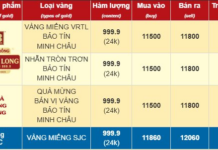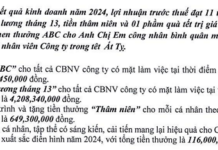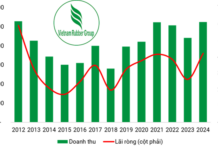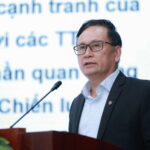On the morning of August 5, Prime Minister Pham Minh Chinh chaired the regular monthly Government meeting for July 2024, with a packed agenda of important discussions.
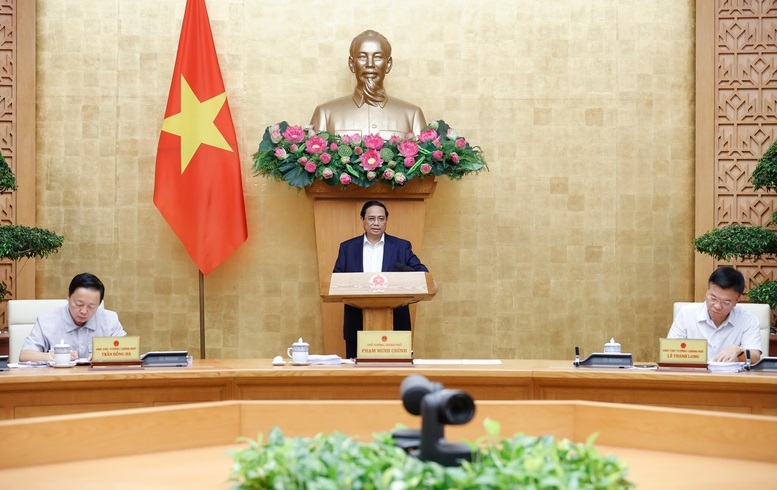
Prime Minister Pham Minh Chinh chaired the regular Government meeting for July 2024, with a full agenda of important discussions – Photo: VGP/Nhat Bac
|
The meeting focused on discussions about the socio-economic situation in July and the first seven months of the year, the allocation and disbursement of public investment capital, the Government’s direction and management, and other key tasks for the coming period.
The Purchasing Managers’ Index reached a five-year high
Reports and opinions presented at the meeting concurred that the socio-economic situation in July and the first seven months showed 13 outstanding results.
First, the economy continued its positive growth trend in all three sectors. The agricultural sector maintained stable growth.
The industrial sector recovered well, with a 0.7% increase in July compared to June and an 11.2% rise year-on-year; in the first seven months, it grew by 8.5%. Sixty out of 63 provinces and cities saw an increase in the industrial production index in July compared to the same period last year, while three saw a decrease. Notably, the Purchasing Managers’ Index (PMI) for July 2024 reached 54.7 points, the highest since November 2018, with strong growth in output and new orders.
The service sector continued to grow; total retail sales of goods and services revenue in July increased by 9.4%, and in the first seven months, it rose by 8.7%.
Second, the macroeconomy remained stable, inflation was kept under control, and the major balances were ensured. The consumer price index (CPI) averaged a 4.12% increase in the first seven months, a 0.04% rise compared to June (while core inflation rose by 2.73%, up 0.02% from June) in the context of basic wage increases. Energy security and food security were guaranteed (rice exports reached 5.18 million tons, with a turnover of nearly 3.3 billion USD, up 5.8% and 25.1% respectively compared to the same period last year); the labor market recovered well, basically ensuring a balance between labor supply and demand.
Third, exports continued to grow strongly, with a large trade surplus, contributing to a positive balance of payments. Exports in July increased by 6.7% compared to June and 19.1% year-on-year; in the first seven months, exports rose by 15.7% (the domestic sector grew by 21.1%, higher than the FDI sector, which increased by 13.8%); imports rose by 18.5%; and there was a trade surplus of 14.08 billion USD.
Fourth, State budget revenue increased sharply, and the financial and State budget situation continued to improve. The total State budget revenue in the first seven months reached an estimated 69.8% of the yearly estimate, up 14.6% over the same period last year (while 87,200 billion VND of taxes, fees, and charges were exempted or reduced). Public debt, Government debt, foreign debt, and budget overspending were kept lower than the set limits.
Fifth, tourism recovered strongly, surpassing pre-pandemic levels. International visitors in July reached 1.15 million, and in the first seven months, the figure was nearly 10 million, up 51% over the same period in 2023 and 1.9% higher than in 2019 before the COVID-19 pandemic.
Sixth, investment development continued to achieve positive results, creating a driving force for growth. In the first seven months, 34.68% of the public investment plan was disbursed. FDI attraction reached 18 billion USD, up 10.9%; FDI realization reached 12.55 billion USD, up 8.4%, the highest in the last five years.
Seventh, business development continued its positive trend. In July, there were 14,700 newly established enterprises, up 7.3% over the same period last year; in the first seven months, there were 139,500 newly established and re-operating enterprises, up 5.9% over the same period last year (higher than the number of businesses withdrawing from the market).
Eighth, culture and social sectors were given due attention, and social security was ensured. The 77th anniversary of War Invalids and Martyrs’ Day was well organized. The new salary policy, which took effect on July 1, 2024, was implemented properly and adequately, along with other policies and benefits for people with meritorious services and social protection beneficiaries. The total budget for benefits and allowances for people with meritorious services to the revolution increased by more than 5,300 billion VND. In July, 95.8% of households reported stable or higher income compared to the same period.
Ninth, the salary reform policy, implemented from July 2024, received the consensus of the entire political system and the people across the country.
Tenth, the Government focused on building and has basically completed the issuance of decrees guiding the amended Land Law, Housing Law, Real Estate Business Law, and Credit Institution Law.
Eleventh, administrative reforms, especially the reduction and simplification of administrative procedures, digital transformation, Proposal 06, and anti-corruption efforts, were promoted, contributing to strengthening people’s trust.
Twelfth, political and social stability was maintained; national defense and security were strengthened; and social order and safety were upheld. The election of Comrade To Lam as General Secretary by the Central Committee with an absolute majority of 100% of the votes affirmed the great unity and consensus within the Party. External affairs and international integration were promoted; the country’s prestige and position were enhanced; and many international organizations and experts continued to highly appreciate Vietnam’s economic results and prospects.
Thirteenth, the Government promptly addressed the consequences of natural disasters and floods and supported families who lost their loved ones and those whose houses were swept away or damaged.
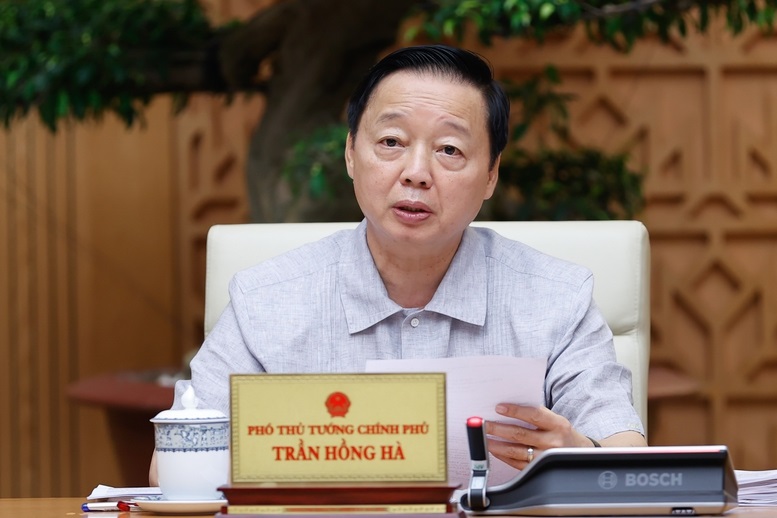 Deputy Prime Minister Tran Hong Ha speaks at the meeting – Photo: VGP/Nhat Bac
|
Achieving better results month after month
Concluding the meeting, Prime Minister Pham Minh Chinh agreed with the reports and opinions presented, emphasizing additional points on the direction and management and the results achieved in July and the first seven months of the year.
In July, the Government coordinated with relevant agencies to organize the State funeral for General Secretary Nguyen Phu Trong solemnly and safely, reflecting the deep sorrow and gratitude of the entire Party, people, and army for the late leader.
The Prime Minister appreciated that, since the beginning of the year, all levels and sectors, and localities have proactively and actively implemented tasks and solutions according to the resolutions, conclusions, and directives of the Central Committee, Politburo, Secretariat, National Assembly, and the direction of the Government and the Prime Minister.
Especially, we have closely monitored the situation and handled emerging issues in the short term flexibly, timely, and effectively, ensuring harmony with medium- and long-term tasks and solutions. Ministers, heads of agencies, and Chairpersons of provincial People’s Committees have proactively and actively performed their functions, tasks, and powers.
In July, the Government issued 23 decrees and 20 resolutions and the Prime Minister issued three decisions, eight dispatches, and four directives; in the first seven months, 104 decrees, 153 resolutions, 812 decisions, 24 directives, and 71 dispatches were issued.
The Prime Minister has issued many dispatches and documents directing the promotion of growth, control of inflation, and stabilization of the macroeconomy; overcoming the consequences of floods and storms, and prevention of natural disasters and diseases; and organizing national conferences on promoting public investment, urging the progress of key infrastructure projects, and the 500 kV power line project…
Regarding the socio-economic situation in July and the first seven months of 2024, the Prime Minister stated that the situation continued its positive trend, and generally, the results of July were higher than those of June, and the results of the first seven months were better than the same period last year in most fields.
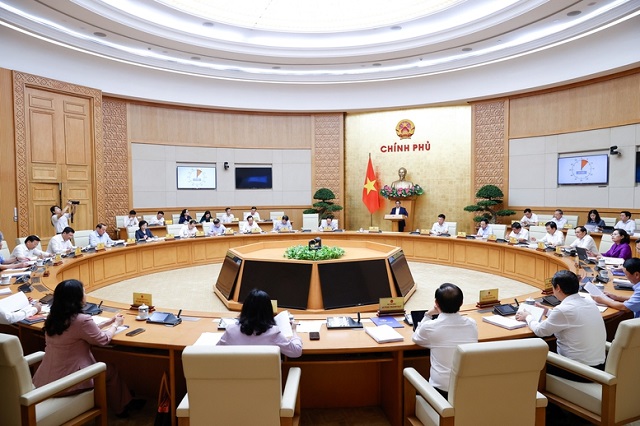 The reports and opinions presented at the meeting concurred that the socio-economic situation in July and the first seven months showed 13 outstanding results – Photo: VGP/Nhat Bac
|
On behalf of the Government, the Prime Minister acknowledged, thanked, praised, and highly appreciated the efforts of the Government members, the leaders of ministries, agencies, and localities, and the coordination of the political system, which contributed to the country’s common achievements.
Along with the achieved results, the Prime Minister pointed out the existing difficulties and challenges, including inflationary pressure, especially due to volatile oil and food prices; risks in the global financial, monetary, and real estate markets; and unpredictable global growth, trade, and investment prospects. Production and business activities in some sectors still faced difficulties. Access to credit remained challenging. The real estate market has initially stabilized, but difficulties and obstacles have been slow to resolve. The deployment of the VND 140,000 billion credit package for social housing has been very slow, and there is still VND 26,500 billion of public investment capital yet to be allocated.
The lives of a part of the people, especially in remote, border, and island areas, remain difficult. Natural disaster damage in the first seven months was VND 2,123 billion, 2.3 times higher than the same period last year. Crime, especially cybercrime, remains complex; and some serious labor accidents and fires have occurred…
After analyzing the reasons for the achievements and limitations, the Prime Minister agreed with the lessons drawn in the reports and the opinions expressed at the meeting, emphasizing the following lessons:
It is necessary to strengthen unity and consensus within agencies and units and the entire political system and people; closely follow the situation and respond to policies promptly, flexibly, and effectively; enhance discipline, order, and the responsibility of the head; promote decentralization and delegation of powers, combined with the allocation of resources, improving the capacity of lower levels, and strengthening inspection, supervision, and control of power; and pay more attention to information and communication, especially policy communication, contributing to building trust and creating excitement and promoting self-reliance, self-improvement, determination, and efforts to rise.
Looking ahead, the Prime Minister predicted that the world situation would continue to develop rapidly, complexly, and unpredictably, with both opportunities and challenges, but more challenges.
The Prime Minister stated the goal of continuing to maintain macro-economic stability and control inflation while promoting stronger growth, ensuring the major balances with higher surpluses, and controlling public debt, government debt, foreign debt, and budget overspending. The political and social stability, national defense and security, and sovereignty over borders must be maintained. The general direction is that the results of the following months must be higher than those of the previous months, the following quarters better than the previous quarters, and the achievements of 2024 more comprehensive and complete than those of 2023.
Regarding the tasks and solutions for the coming time, the Prime Minister agreed with the contents of the reports and opinions and emphasized 12 key tasks.
First, ministers, heads of agencies, and chairpersons of provincial People’s Committees, according to their functions, tasks, and powers, closely follow the situation and organize the implementation of the resolutions of the Party, conclusions and directions of the Central Committee, Politburo, Secretariat, and National Assembly, and the direction and management of the Government and the Prime Minister, with a sense of responsibility, focusing on key tasks, settling each task thoroughly, and clearly assigning tasks with specific deadlines and requirements. It is necessary to strengthen supervision and inspection, promote emulation and commendation, and handle violations in a timely manner.
Second, continue to prioritize promoting growth in association with maintaining macro-economic stability, controlling inflation, and ensuring the major balances of the economy.
Continue to proactively and flexibly manage monetary policy, in coordination with fiscal policy expansion reasonably and with a focus on key tasks, and other macro policies.
Regarding monetary policy, the State Bank will focus on stabilizing exchange rates and the foreign exchange market, increasing access to credit, especially for priority areas, striving for a credit growth rate of about 15% for the whole year, and continuing to reduce lending interest rates. Regarding fiscal policy, the Ministry of Finance will strive to increase revenue, save expenses, and promote digital transformation and the application of e-invoices in revenue management. It will also implement policies on tax, fee, and charge exemption and reduction effectively.
Synchronously implement solutions to control inflation according to the set targets. The Ministries of Finance, Industry and Trade, Agriculture and Rural Development, Education and Training, and Health, and relevant agencies will focus on ensuring stable markets and prices for essential goods. Prepare carefully, assess the impact, and have a roadmap for adjusting the prices of services managed by the State (education, health) suitably. Be determined not to let any shortages occur and ensure sufficient supply of electricity and gasoline to meet production and consumption demands in all cases.
At the same time, the Ministries of Planning and Investment and Finance will proactively build a five-year socio-economic development plan, a five-year financial plan, and a medium-term public investment plan for 2026-2030. In particular, it is necessary to pay attention to not spreading resources too thinly; central budget investment should be concentrated on important and key national projects and inter-regional and international connection projects.
Third, focus on renewing traditional growth drivers and strongly promoting new growth drivers. Regarding investment, the Ministry of Planning and Investment will take the lead in promoting the implementation of public investment projects and three national target programs, promoting private investment, and strengthening public-private cooperation and selective FDI attraction.
Regarding exports, consolidate large and traditional markets and expand new markets (UAE, Halal, Latin America); support enterprises in meeting new standards and green standards, promoting trade promotion and market access, and responding to anti-dumping investigations against Vietnamese goods…
Regarding consumption, promote market development, stimulate domestic consumption, promote the “Vietnamese people give priority to using Vietnamese goods” movement, e-commerce, and cashless payment (associated with e-invoices and tax collection).
Have effective mechanisms and policies to strongly promote new growth drivers (especially in terms of institutions, policies, regional linkage and development, digital transformation, green transition, circular economy, sharing economy, knowledge-based economy, and high-value sectors and technologies such as chip manufacturing and AI…).
The Ministry of Planning and Investment will take the lead in reviewing and proposing mechanisms and policies to create breakthroughs in these areas, including building and perfecting the legal framework for green development (green credit market, green transition, circular economy…); and studying policy packages with sufficient scale, feasibility, and suitability to support enterprises and promote new growth drivers such as chip manufacturing and AI. The Ministry of Finance will urgently complete the proposal on developing a carbon market in Vietnam.
Fourth, resolutely promote the disbursement of public investment capital and three national target programs. Continue to promote the activities of the five Working Groups of the Prime Minister and 26 Working Groups of the Government members.
The Ministries of Transport, Industry and Trade, Planning and Investment, and Construction, according to their functions, tasks, and powers, will accelerate the progress of key and important national projects (especially the 500 kV power line project from Quang Trach to Pho Noi, which will be inaugurated on the occasion of the 79th anniversary of the August Revolution and National Day on September 2); and the system of expressways (striving to put into operation about 3,000 km by 2025).
Urgently allocate the remaining VND 26,500 billion of public investment capital. The Ministry of Planning and Investment will resolutely transfer capital to tasks and projects with fast disbursement and capital needs before August 15, 2024.
Fifth, promote the improvement of institutions and laws, administrative procedure reform, and national digital transformation.
Focus on reviewing and proposing solutions to handle inconsistencies, overlaps, and impracticalities in mechanisms, policies, and legal regulations; and report to the Steering Committee for handling problems in the system of legal documents.
Expedite the issuance







